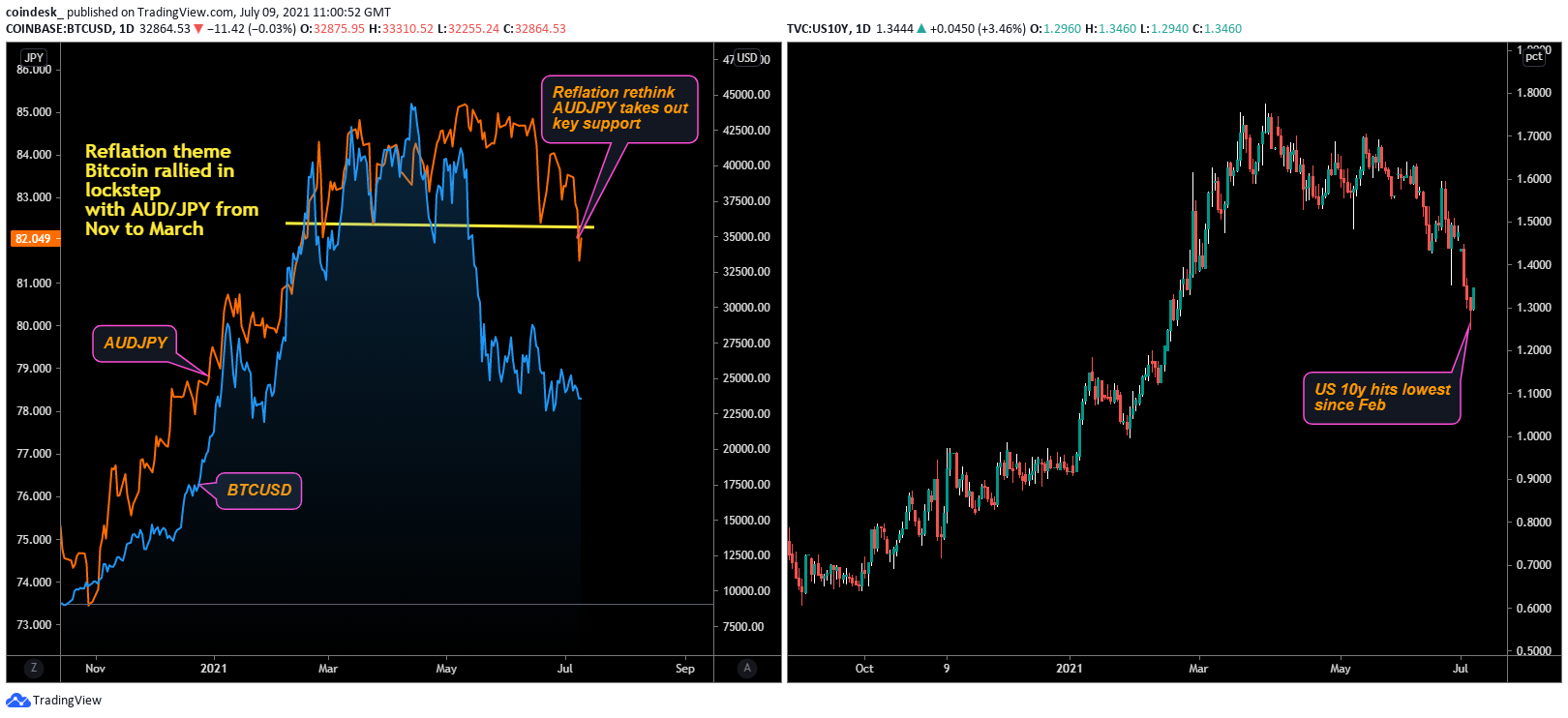
Reflation-Trade Rethink Keeps Bitcoin Under Pressure
While bitcoin's blockchain data shows signs of green shoots, the macro environment doesn't appear conducive to a bullish revival.
In particular, the unwinding of the reflation trade – or bets that benefit from a pickup in growth and inflation – might be keeping bitcoin under pressure, analysts say. Evidence for the unwinding comes from a recent slide in bond yields and weak commodity-linked currencies.
"The unwinding of the reflation trade is impacting bitcoin," Noelle Acheson, head of markets insights at Genesis Trading, told CoinDesk, adding that many investors allocated the cryptocurrency to their portfolio as an "inflation hedge".
Reflation refers to an increase in economic activity and inflation after a depression or recession. When anticipating reflation, investors typically buy industrial commodities, currencies linked to commodities such as the Australian dollar, shares of economically sensitive companies and perceived inflation hedges like bitcoin and gold. They tend to sell bonds, driving yields higher.
The so-called reflation trade became popular after March 2020, when policymakers worldwide pledged unprecedented monetary and fiscal stimulus and raised hopes for a V-shaped recovery in economic activity and inflation.
The trade picked up steam in November after the U.S. presidential election, as evident from AUD/JPY (Australian dollar/Japanese yen) currency pair's rally from 72 to 84 in the five months to March and the uptick in bond yields (bond prices and yields move in opposite directions).
Bitcoin also charted a sixfold rally to almost $60,000 during that period, moving in lockstep with AUD/JPY. The currency pair might be a better indicator of reflation sentiment than most traditional assets, as the Australian dollar is sensitive to commodity prices and the yen is seen as a haven. Australia is one of the top exporters of copper and iron ore.
The positive correlation suggests that the reflation theme played a big role in bringing money into the bitcoin market.

BTCUSD vs AUD/JPY and 10-year U.S. Treasury yield
Both bitcoin and AUD/JPY peaked in March and April. Bitcoin tanked in May on renewed concerns of tighter regulation and Tesla's decision to delist the cryptocurrency as a payments alternative, and AUD/JPY has begun to lose altitude in recent days, hinting at an unwinding of the reflation trade and flight to safety.
The bond market is signaling the same thing, with longer duration yields falling sharply in recent days. The 10-year U.S. Treasury yield fell to a 4 1/2-month low of 1.25% on Thursday. "The bond market is telling us that inflation could be transitory," Acheson said.
For now, there is less incentive for investors to pour money into inflation hedges, including bitcoin. The cryptocurrency may face selling pressure if markets continue to unwind reflation trades, leading to a full-blown sentiment to avoid assets deemed to be risky.
"The reflation rethink is beginning to take a toll on equities, and if risk aversion worsens, bitcoin may see a deeper decline," said Pankaj Balani, CEO of Delta Exchange.
U.S. stock benchmarks dropped on Thursday, with the Dow Jones Industrial Average losing more than 250 points and futures down almost 500 points at one point earlier in the day. Bitcoin also fell by nearly 5% to $32,100.
"Bitcoin is still considered to be an emerging market and is thereby somewhat exposed in periods of intense risk-off, at least for now, despite the longer-term store of value proposition," Joel Kruger, a currency strategist at LMAX Digital, said.
Sentiment appears to have stabilized at press time. Dow futures are currently trading 0.55%, or 180 points, higher, and bitcoin is unchanged on the day at about $32,900, according to CoinDesk 20 data.
Also read: Circle CEO Says USDC to Take High Road, But It's a Long Road
DISCLOSURE
The leader in news and information on cryptocurrency, digital assets and the future of money, CoinDesk is a media outlet that strives for the highest journalistic standards and abides by a strict set of editorial policies. CoinDesk is an independent operating subsidiary of Digital Currency Group, which invests in cryptocurrencies and blockchain startups. As part of their compensation, certain CoinDesk employees, including editorial employees, may receive exposure to DCG equity in the form of stock appreciation rights, which vest over a multi-year period. CoinDesk journalists are not allowed to purchase stock outright in DCG.


